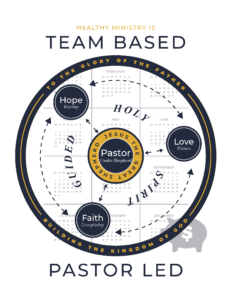Missional Living w Charles Fleming
Welcome to the GC Podcast. A podcast to help you develop into the healthiest ministry leader you can be by sharing practical ministry experience.
Cara: Hello friends, and welcome to the latest episode of GC Podcast. This podcast is devoted to exploring best ministry practices in the context of Grace Communion International churches.
I’m your host, Cara Garrity, and today I am blessed to interview Charles Fleming. Charles retired from GCI in 2019 after over 40 years of service, and during that time he served as a pastor in Jamaica, regional director for Latin American, Caribbean, and a mission developer for the Caribbean region. He’s particularly passionate about the health of the church mission and Spiritual formation.
These days he’s living in Orlando, Florida with his wife, Carmen. They have three adult children and two grandchildren, Addison and Luke. Charles, thank you so much for joining us today. It’s a privilege to have you on the podcast.
[00:01:05] Charles: Cara, thank you so much for having me. I feel very privileged that we can talk about mission, which in many ways is the heartbeat of the church because our Lord Jesus Christ was that first missionary who was sent from heaven. I’m just excited to be with you. Thank you for the opportunity.
[00:01:22] Cara: Absolutely. And amen. Already you’re starting to preach to us, so I say, why don’t we just go on ahead and dive on in. The first thing that I want to ask you, Charles, is what does mission mean for the church?
[00:01:39] Charles: Cara, that’s such a great question. But before we can really talk about what mission means for the church, I think we need to talk a little bit about what is mission. And my simple understanding of mission is what God does. And we get to participate in what God does. And so that’s it.
One of the things that I’ve been excited about is, as you read the literature, more and more people, like Ed Stetzer who works with very well known in evangelical circles, has mentioned that one of the big breakthroughs theologically is the recognition that mission is something that God does. That God is a missional God.
And some people even go so far as to say that they’ve added mission as one of the attributes of God. That familiar list of God is ever present. He’s all wise, all knowing. But in reading the biblical and studying the biblical record and just looking at the activity of the Church over the centuries, many people are now saying that mission is an attribute of God.
And when you think about it, Jesus was sent, and a missionary is someone who is sent. Jesus was sent by the Father, and he actually said as the Father, as he closed his ministry, getting ready to go to the cross, that ultimate sacrifice where he expressed the love of God. Mission is really the overflow of God’s love.
So, Jesus, coming from Father with the Spirit, was that overflow of love and the expression on the cross. But just before he died, he met in private with his disciples in that upper room of John 20. And he says, as the Father has sent me, so I am sending you. So that was like a private commissioning for the disciples, and when becoming now apostles, people who are sent. And then of course there’s the public anointing on Pentecost where the Spirit is given in a very public way.
But back in that private commissioning, Jesus literally breathed on them, says, my peace be upon you. And that word “breath” just evokes an image of the garden of Eden where God breathes a new reality, new entity into reality, humanity. He breathed into our parents, into Adam, the breath of life. And the astronomists tell us that we are stardust because the physical elements of us come from the universe, from the stars.
But when you think of Genesis, we are actually God breathed. We’re not just stardust, but we are God breathed. In that private commissioning, Jesus is creating something new, the church. And so, he breathes life into it. And that helps me to understand why he says his church will never die out because the very life breath of God is in the church. And the reason the church was raised up was to participate with Jesus in the ongoing mission, his ongoing mission.
Mission really explains the nature of and the purpose for the church. We are God’s representatives, his ambassadors, we are a royal priesthood. And I love that term from the Peter’s epistle where he talks about the royal priesthood, because the Bible’s a book that just evokes images.
And you go back to the Garden of Eden, and we see God’s story unfolding in the Garden of Eden. In the Garden of Eden, we see the intent, the original intent of God in creating humanity. He literally created a family when he created Adam. I don’t think it’s an accident that in Luke 3:38, when Luke is giving the genealogy of Jesus, he says, this person was the son of such and such, and that was a son of such and such. When he gets all the way back, he says, and Adam was the son of God.
Many years, I just thought of that as like a literary device, or oh yeah by creation. But when we look at Genesis 1 and 2, we see God fathering his created family, because what does a father do? He provides safety and security.
And what is the Garden of Eden? On a planet that’s teaming with potential but not developed, God places Adam, but not in the undeveloped wilderness. He carves out, he creates a garden. So, for the first time on the planet is what we would call, we humans call culture. There’s agriculture and horticulture.
God creates a safe place for his children. And then you get this picture of him pointing to trees and saying, these are for food. What does a parent do? He provides the physical needs of his children. So, he provides the physical needs, but also the psychological. God is keeping company with Adam.
And then God says these words. He says, it’s not good for this male to be alone. And so, he creates one like him, one equal with him, and declares the two, man and woman, image bearers. There’s an equality in scripture, so we see God’s heart. I’ve created a family that is capable of multiplying. I’m taking care of their physical needs, their safety needs. I’m taking care of their psychological needs.
And then he’s made us to have a needing for purpose and significance. He then says, you are my image bearers. You represent me. This is almost like a priestly role. I want you to view what I’m doing here in this garden. And for me, the Garden of Eden is like a model home.
It’s interesting, Cara, when I first moved in, Carmen and I moved into this house here in Orlando, we drove up from South Florida. And we saw all the beautiful models in the office. But I told the real estate agent, I want to see the property. And he says, you don’t want to go there; it’s just swamp and mosquitoes and trees. And I go, I want to.
At the time, I don’t know why I did it, but now I look back I got a picture of what Eden was like, because we went, and he was right. It was swamp, it was mosquitoes, it was trees. But then six months later we moved up, and there was a subdivision with infrastructure streets and electricity and water and a beautiful home, the home that we wanted.
And even in our fallen state, we are doing what God intended back in the garden where he said, multiply and fill the earth. I want you to do to the rest of the earth what I have done here. I’ve taken this section of the planet that’s teaming with potential, but I’ve developed it as a model to you of what I want you to do.
This was God’s dream. And we see that God had a bigger purpose. He was going to be mentoring Adam and Eve. He’s empowering Adam. He says you get to name the animals. That’s not just giving tasks or responsibilities, it’s giving authority because you are, to use the words from Genesis, you are to rule with and under me.
So, it’s a kingly role. A priestly role was God’s intent. And we read of a tree of life that—in a way I don’t understand—that God was going to allow them, if they made the right choice to somehow transition from mortal to immortal, to borrow Paul’s words. But we know that it was eternal life that was being offered if they made the right choice because he says once they sinned, I’m barring you from this tree because I don’t want you to live forever. Because he knew the kind of hell on earth we would create, and there was no way he was going to allow us to impose on ourselves an eternity of misery and allow us to contaminate the beauty that is heaven, his heavenly realm.
And when you read Genesis, and when I get to the end of chapter 2, if Genesis were a movie, we would cue the ominous music. And very often when I read the end of Genesis 2, I’m actually hearing the theme from Jaws [1975 US film about a shark]. Now that may not be a good representation, but I think you know what that sounds like from Jaws.
But we know what comes in Genesis 3; we call it the fall. And at that point we recognize from the rest of Scripture that the triune God—that sweet society as the Quakers call the Father, Son, and Spirit—they had a choice to make. They have chosen freely to create us, and out of the freedom of their love, they have created us, and they want us to love them back in freedom.
They’re not going to impose us. They’re not going to force us to love them. So, they’ve given us a choice. We can choose to let God be involved in our lives. And think of the beauty of that picture in Genesis 2; it says in the cool of the evening, God comes looking for them. But what do humans do in the cool of the evening?
It’s an evocative phrase. We sit back on the back porch in the evening when we have the time, and we commune with each other. God was not just task-oriented with Adam and Eve; he was enjoying them. God has created a family to enjoy them and enjoy him, the family to enjoy each other.
But also, to be involved in the family business because he’s sending Adam and Eve out to replenish this earth, to fill this earth with life, and to be the priests who would bring out the full potential of the planet to the glory of God, and also to bring joy to ourselves. So that’s the heart we see in Genesis. A God who says, I’ve created a family, and I want to invite them into the family business.
But of course, our parents went prodigal. And if this were a TV series, we would have to get the backstory at this point. And Genesis 1 gives us a glimpse into that backstory where there was a time before time, if I could put it that way, where the triune God had a conversation, let us make humans in our image and likeness.
And they made this decision. But once the fall happens, that prodigal move, we find that God says, we are not going to live through eternity without our beloved family. So now God goes into the phase of regathering the family.
And he sends Abraham to a new land to build a relationship with God. He raises up Israel to be in anticipation of redemption because they were to be a nation representing God’s ways. It literally says in Exodus 19, that they’re to be a kingdom of priests echoing Genesis. You’re going to be a kingdom of priests representing what life under my rule can be like.
And we know Israel failed, but ultimately Jesus was sent and he self-identified as one who is sent. He says, for this reason, I was sent to preach the gospel of the kingdom of God, the rule of God in our lives. This loving, generous, benevolent rule by our God who just loves us and wants us to be a part of the family and wants us to live on into eternity in doing the family business. Because in Revelation, it tells us that we then get to inherit all things, and we will reign with him.
I don’t know what that’s going to be like. I don’t speculate. I just know that if God says he wants us to be kings and priests with him, it goes all the way back to his original intent and it’s going to be good. I look forward to that.
I think you see if we think of God’s story and see God’s story in this way, we see a God who is sending and sent. And so, what does that mean for the church? It means that we exist as God’s called-out people to represent him, to be that royal kingly priesthood, as Peter puts it.
And therefore, we worship God—and I really appreciate in our church the way we’ve come up with these Love Avenues—but we worship God. We are building a family that is loving and enjoying each other. But we also understand that we exist not for ourselves, but to go forth, to be sent forth.
So that’d be my answer. What does the mission mean for the church? It helps us to understand the very nature and the purpose for the church. We’re not called up because we’re better or more special compared to others. We’re just privileged to join Jesus in his love, ongoing labor of love on this planet.
[00:14:33] Cara: Amen. Thank you, Charles. That is such a rich—just full of meaning and God’s story. It’s not just, mission is a thing that we think about or do, but it’s part of who God is and who we are purposed to be as the church. And I’m wondering because often we can think of mission as just something that we do maybe one time a year or one activity or maybe just something that we think about or intellectualize.
What do we risk when we do neglect missional rhythms that have depth and richness to them?
[00:15:16] Charles: Ah, Cara, we risk so much because first of all, we’re missing the fullness of who God is. And I love to tell that story because I think story rather than—there’s beauty in the traditional view of Creation, fall, redemption, new creation. You probably saw that as a structure behind the story I told. But rather than putting it in these sparse terms that are almost sound theologically out there, God has created us to be a storied people. We live out of stories that trigger our imagination.
Eden is not like Camelot. It is not some mythical, we think it might have happened, and we hope it happens again. It’s a reality that tells us the heart of God. And to answer your question, we are missing a piece of who God is.
He’s a Father who has created a family, and there is a Son who is that older brother that did not leave when our parents went prodigal, he stayed at home. But unlike the older brother in the parable, when he stayed at home, he totally identified with the Father. Because he is God like the Father. And when he did leave, like the youngest son, he came for a different reason. He came to rescue us. And so, we miss a dynamic of Jesus.
One of the things that has struck me is in Hebrews 3:1, we read that we get to partake in the very ministry of Jesus, and it’s described in two ways, the apostle and high priest. And we spend a lot of time on the high priest passage, which we need to, but we don’t really develop the apostle part, that Jesus is the original sent one.
There’s a whole dimension to Jesus that is missed if we neglect mission, that Jesus is the missionary. And then of course, we run the risk of just becoming a closed society, shutting ourselves off from the world, protecting ourselves. Or on the other hand, we become judgmental and look down on the rest of the world rather than seeing we’re a bunch of prodigals who have been privileged to know Christ and saved, and now we get to join Jesus in reaching out to our brother or our siblings who our prodigals still in the way we were.
I think that’s some of it, that our attitudes are malformed. Our hearts are also malformed if we miss the heart of God that is represented by mission and by Jesus as the missionary.
[00:17:50] Cara: Yeah. That’s really powerful because again, it comes back to, what is mission and it’s at the heart of who God is and who Jesus is as the sent one.
And that makes me think about another angle or experience of who we are as his followers. And what it means to experience and grow in who he is. When this podcast episode is released, it’s going to be, in the worship calendar, Ordinary Time. And it’s a time when we think about being discipled and being sent in disciple-making mission.
How are these missional rhythms that we’re talking about actually participating in this sent-ness that is at the heart of who God is? How is it connected with discipleship and being a disciple of Christ?
[00:18:54] Charles: What a great question, Cara. And you really put your finger right on it.
The whole concept of sent-ness, in other words, if it is true—and it certainly is—what Paul said in Relations 4:19, that until Christ is formed in us, if that is our quote unquote destination, in other words, that as Christ by his Spirit works in me and transforms me into his image, he’s discipling me, then I want to have an identity of being sent.
I would say three things in response to your question. There’s identity, there is a posture, and then there’s habits of mission. And let me explain what I mean. I think maybe I can tell it with a story. I read Michael Frost’s book on Surprise the World, The Habits of Highly Effective Missional People.
I read that about 5, 6 years ago. And I led a discipleship group and also had the opportunity to teach some of it to a congregation. And here’s the mistake I made. I went straight to the habits. Eat with people, bless people. And it never worked. None of us changed in any way. We got excited for three or four weeks and then, just like the dew before the rising sun, had evaporated.
And then about a year ago, Anthony Mullins, who is regional director for the Southeast. And I support Anthony in what he’s doing. He sent the book to me, and I’d forgotten about the book. And this time I read it all the way through. And at the end of it, Michael Frost says, these habits are intended to help us grow into an identity of sent-ness.
So, what I would say is I made a huge mistake. I just went straight for behavior. And we need to act from the very beginning. I’m not saying that. But unless we integrated into the idea that we are developing an identity of being sent, it will not last. And that’s where posture comes in. I see posture as an attitude, an orientation, out of becoming like Jesus and growing into sent-ness that we begin to have a posture that says, I want to get in out there and I want to share some of this wonderful news with others.
So missional rhythms, I think we have to do all three at the same time, but maybe at the beginning, stress that this is about affecting your identity.
And I’m teaching a class on missional living at GCS [Grace Communion Seminary] right now. And one of the things I’ve tried to help people to understand how we grow into the image of Christ is to say, let’s look at the “I am” statements in our lives. And there are a number, a cluster of “I am” statements that round out identity.
For example, you might say I am a woman. I would say I am a man. We’re beginning to identify ourselves. We might say, I am a citizen of the United States, and that’s our social location because it gives us a history, a sense of belonging, and it also gives us a sense of purpose.
And then we might talk about our profession, I’m a teacher, a truck driver, and we round it out And one of the challenges I’ve given the students is to say, do you include in your “I am” statements, and does it come from your heart: I am one sent? I am a fellow missionary with Jesus. There is an intentionality that says, when I take Michael Frost’s book and I start inviting people to eat with me, and I start seeking to bless people who maybe are not Christians, am I at the same time saying, Lord, help me?
So that it becomes, I lean into this, the posture of my heart is I want to be with Jesus as he ministers to people that I happen to meet and maybe I get to participate. Am I? And so, I’m trying to use the “I am” statements to add to that cluster, rounding out my identity. I am once sent.
So, I’m trying to use that language as a way of helping me and reinforcing what the action is doing. And then when you are out there sharing with people, Jesus becomes very evident. You see the way he works; you say something that you thought was a casual comment, and a few weeks later, somebody says that really helped me. And you [think], how do you remember me saying that? Must have been the Spirit.
To me, one of the rhythms for growing interpersonally is that we recognize the need for action. We need to go into action. We need to be involved in the Love Avenue, but we also need a posture, which is like Spiritual formation.
We need to be part of the Faith Avenue where we are living life on life with members of the family. But we’re looking for ways to invite people who are not yet aware of their membership in the family to join us. But at the same time, in our devotions and in our conversations, we’re saying, Lord, I am just grateful to be one sent. Can you help me to change my perspective of not understanding that I can?
It becomes natural, and obviously this will take time. You don’t take on something at a deep identity level overnight. But there’s some intentionality and a systematic approach, so that’s how I’m trying to approach that.
[00:24:10] Cara: Yes. And you know what I really like about how you’ve just talked about this—discipleship is about transformation. And it’s not just that behavior modification. So, if being sent, if in ordinary time, we’re thinking about who are we as disciples and who are we as being sent in disciple-making mission, it does come down to that identity. And is this coming out of growing in our identity in Christ or is it just something we think that we’re supposed to do to check something off a list? And you mentioned earlier too that part of the heart of mission is: what is God doing?
When it flows from identity, I’m sure that it would keep us more Christ-centered in that way, because it’s not about, I did this missional thing. But when it comes from our identity in Christ, it’s, oh, this is what God was up to. And I just had the privilege to participate, to come alongside.
Yeah, that’s excellent. That’s excellent. Yes. You did mention the Avenues as well. I think that it’s really important to think about how we practice the missional rhythms together as a church community. Because as you said, mission is the purpose of the church.
So, if mission is foundational to why the church exists and missional rhythms aren’t just an activity to do, but part of the heart of God and who he’s making us to be as his sent people, then they’re not just activities that are secluded to the Love Avenue. Missional rhythms show up across all aspects of ministry, all aspects of being the church.
I’m wondering what are some examples of what this can look like? Because the Love Avenue is where we do concentrate and give focused attention to missional rhythms. But what does it look like to pay attention to missional rhythms across all Avenues of ministry?
[00:26:30] Charles: I like that question. Before I answer it, could I just hit one thing in terms of growing into this image of sent-ness?
We need to recognize that the church does not have a mission, but rather God has a mission, and the church is the instrument of that mission. So, it’s more accurate to say God’s mission has a church. This is the expression in our world. In the way Israel was supposed to be a presence of God, of what a kingdom looks like, we as individuals and as a corporate body are God’s representatives. We are the only institution that Jesus says, I sign off on this. It’ll never die out because it is that important to God.
I put alongside the “I am” clusters, this idea that we need to allow the Spirit of God to help us to move from saying mission is optional; some people are missional, and some are not. No, every Christian should have an identity of being sent, which brings me back now to, to your question.
When I look at the three Avenues, I just thank God for it because having been involved with the transformation of our church from back when it began in 1995, as I recall, God has done a remarkable transformation of the cultural life of what was WCG and is now GCI.
We have come to know God, the who question, who is God has transformed us. We know God in a different way, and because of that, we know ourselves in a different way. And we see other people in a different way. And one of the things that has struck me with the students that are in the missional living class is just the energy and eagerness to go out on the Love Avenue.
To the question, how do we do it? Because we’re committed. That’s the posture, the leaning forward that I see in the 12 students. Which tells me that the idea to come up with these three Avenues is Holy Spirit saying, we now need a way to focus and channel this energy that has been building up in us because of the incredible transformation of our culture.
So, we now have a structure, and I love the name Avenues because what happens in avenues? Things flow. When I look at them, my first thought is every one of us wants to be an expression of, and a representative of the Hope Avenue because we all respond to our God with worship. So, we want our church to have a very good, solid leadership, Love Avenue group that is leading us. But all of us want to learn to better worship God. So that everybody, that’s for everybody.
The Faith Avenue is where we do life on life and really and truly a high priority. In my mind for us, really is to begin to foster and cultivate connect groups because they are a way of putting some structure within churches.
But everybody, even people involved in the Love Avenue need the Faith Avenue, and then I’m back to sent-ness. Everybody needs to be sent.
So, when you talk about rhythms, when I look at where we are as a denomination, even though mission is my passion, here’s the advice I would give to pastors and leadership teams, whether it’s a congregation or a fellowship group: I would say you’ve probably got your Hope Avenue. Chances are most groups have their Hope Avenue pretty well developed because we’ve spent most of our human resources, our energy, and our time in our worship services. We’re not where we need to be yet, but the RCL has just breathed a life into our congregations.
If I were a pastor, I would say in terms of rhythms, I would disconnect myself a bit. If I’ve been preaching four times a month, I would cut back to three. If I’ve been doing three, I’d cut back to two and empower some others to step up to free up time for me to put more focus on [the Faith Avenue]. And then we’re doing all three.
But it’s a matter of energy and time and effort. And put more effort into—and even though I’m missional—I would put it into the Faith Avenue, and little less energy into Love Avenue. Why? Because mission is an overflow of God’s love. We want to make sure that we as a people are being so infused with the worship, the learning to worship God in the Hope Avenue. We also want to be strengthened by the incredible disciple-making that happens in the Faith Avenue.
If I could just use throw out some random numbers just to make a point. If you have a 100% of energy that you can give to the church, because you’re a bivocational pastor, you’re a bivocational leadership team, you’ve got your family, you’ve got your own self-care, your own personal growth, as well as the job.
So, you have a certain number of hours a week to give to the church. I would say, okay, I would do enough to keep the Hope Avenue growing and developing, but most of my energy would go to Faith. But I’d also develop a few things on the Love Avenue at this stage in our history where we are. Because the stronger we are with Hope and Faith, the more effective we’re going to be in Love. And I’m not saying we don’t do any of the Love Avenue stuff! That would break my heart because it’s my passion.
But I’m thinking of two things that Jesus said in John 15:8. He says the Father is glorified with much fruit, but then in verse 60, he says, but the Father wants lasting fruit.
And one of the things I’ve learned from mistakes like with the Frost book, you want the fruits, or you jump in and just do the habits. But you’ve not laid the groundwork of the deep preparation, then it doesn’t last. And just thinking of where we are, to answer your question, if I were a leader of a fellowship group or a congregation, that’s some of the thought process I would have.
It’s a discernment not done in isolation. I would include my leadership team. I would even have town hall meetings to get a sense of what are the energy levels. There’s three things I think of in a congregation: what are the energy levels that people have? What is the critical mass? And what time do they have?
Have a town hall meeting and say, we want each of us to be people who are competent in the Hope, the Faith, and the Love. But how much energy do we have and how do we deploy ourselves in a way that we can grow? And from my perspective, and again, I want to stress, I’m a missional guy. But I think we need to add to what the strengths of our Hope Avenue are. Again, because I’m into sustainable growth, I would say for 18 months, I, as a pastor, want to put a lot of energy into the Faith Avenue. Get that really strong.
And we do some missional things along the way because there’s a lot of growth that comes from the doing—not neglecting that. But then once we’ve brought the Faith Avenue to a certain point of strength, then we really put some energy into Hope. And I think what will happen is leaders of congregations and fellowship groups, if you do that, I think you’re going to experience what I experience in this missional living class.
I have just been blown away on the level of inspiration by people who have come in with that posture. They’re leaning forward and they’re just saying show me how, show me how. That’s my take on it one, one person’s perspective.
[00:34:12] Cara: Yes. And as you were talking about even that preparedness, it made me think about if mission is at the heart of who God is and if mission is central to why the church even exists, and as part of who we’re being formed into as disciples as a sent people then, of course, discipleship Faith Avenue is part of the foundation of being sent. And I think about, even if you look at Jesus’s earthly ministry, he didn’t just pluck up the disciples and then be like, okay, now you’re sent.
But he spent that time with them. That would be akin to, in our structure, in our point in time, in history and GCI, of a connect group or something like that within the Faith Avenue. Because we do grow in time and transformation to know who God is. And to know our own identity before we have that overflow in being a sent people.
And like you said, that’s where we get that fruit that lasts, not the, oh, we’re so excited, but then two months later, we’re back to the same old, same old.
[00:35:40] Charles: Cara, could I add something? In other words, on behalf of the Love Avenue, I would say we also want to help people to recognize—and the phrase I use is—mission is done at the pace of life. I think sometimes we get intimidated, oh, we’ve got to do this, that, and the other. And again, all I have to offer is “x,” is most of us, what we experience.
Let me share my experience of how I view mission. As you mentioned, I was a mission developer, which meant that I was traveling to something like 20+ countries, helping our congregations and encouraging growth, et cetera. I’ve had a very wide public ministry where I was on mission with the Lord. Now that I’m retired, here’s what my primary mission is—and it is maybe in some ways even more fulfilling, and I think just as significant as whatever I did when I was full-time in public ministry— I now have two grandkids.
And my daughter, Annmarie, Michelle’s younger sister, lives near to us. When Addison was born, (she’s now six) we spent the first two or three years having Addison Monday to Friday, all day. And I remember how tired Carmen and I would get. We just marveled, and we’d look back and go, when we were in our 30s and 40s, we had jobs and we raised three kids, and now this one baby.
And I remember one night Carmen and I were lying in bed, and she just said, Charles, I love these kids, but I really am so exhausted, and so was I. And I had been reading in Luke 10 where Jesus sends the disciples out, part of his mentoring them to go on mission. And he says, wherever you go, tell people that the kingdom of God has been here.
And I think it was a Holy Spirit moment. I just put my hand on her, and she was laying in the bed next to me and I said, Carmen, kingdom work was done here today. And I just heard her breath out, and she says, that means it soul significant.
Because what’s behind my thought is—I’ve read upon attachment theory that all of us need to be solidly attached to our primary caregivers, especially in the first four years of life. And if that’s not there, then we end up with a lot of the insecurities that we have. And so, I’ve seen my role as, how can Carmen and I help Annie and Mike so that they’re not always exhausted, and therefore maybe cranky with their kids, so that they can have that attachment be positive.
So, we’ve invested. What I’m trying to say is that sent-ness includes going out, but sent-ness is also just doing the things at the pace of life. Are you a grandparent? Maybe you’re teaching your kids to bake. You tell them stuff like, do you know that in Jesus’ day, chances are his mom did the baking and you see the way you are scraping the bowl and eating the raw dough that I left, Jesus probably did that. You’re talking about the incarnation, but you’re bringing it into their lives.
That is some of the teaching I would do. If you go back to the scenario sketch, we’re not as emphasizing Love Avenue fully yet; the focus is on the faith. But it is that kind of perspective I would share with people, that you can be on mission. Talk about place-sharing, I’m place-sharing with my grandkids.
So now I “baby shark, baby shark” is like a hook in my ear. I’m aware of pirates and stuff in the cartoons. I got a repertoire of songs and of cartoons that are now part of my imagination because in sharing time with my grandkids, I’m connecting with them.
I’m on mission in my living room. And so, mission is at the pace of life. And I think if we can help people to see that this first steps to mission are not some giant, we got to go some far place. No, it starts in the home. Things that are ordinary to any grandparent can be made missional.
If we just find ways to just bring it back to Jesus, bring it back to the principles and teachings of the Bible. And I guess if I were to ask people to remember two things from this conversation, mission is what God is doing and we’re privileged to participate with him, and mission is done at the pace of life.
Can I look again at my life and see that maybe I’ve been more missional than I thought, but maybe I can make it even more by being intentional, just doing some of the stuff I do. But we don’t stop there. There’s not an excuse to not go out. It is just recognizing the fullness of what mission is.
But we certainly want to go out. And I would want to stress that we—even in that early 18 months that I sketched in this scenario—we want to do some things together going out, and individually going out. And then when we’ve got our Faith Avenues up to where we think it needs to be, we see that overflow, then we really go full-fledged.
Again, there are many ways to approach that, but that’s just one person’s perspective.
[00:40:53] Cara: And the beauty of this example that you’ve given, Charles, I think is there’s a holistic, kind of whole life encompassing-ness to mission. That’s part of what I meant by how do our missional rhythms, our being sent, extend beyond the Love Avenue?
It’s not just an activity or a program or a checklist or a calendar that’s confined to the activities of the Love Avenue ministries. It’s about our whole lives as they’re shaped by God. And this example that you’ve given with your grandchildren, I think is a beautiful example of what that looks like.
And then as we lean into and are transformed into being God-sent people, then corporately together as a church, we bring in that intentionality, right? And then we lean into and grow our Love Avenues and in specific ways, but it does come out of that overflow of who we are and who God has made us to be.
And your example even brings up for me this question that, when we think about rhythms and this year we’re talking a lot about healthy church rhythms, but when you look at nature, rhythms aren’t stagnant or very calculated. They’re often dynamic.
And when we think of specifically about missional rhythms and mission being what God is doing, God is a dynamic God. And I would think that missional rhythms, what mission looks like, can change from season to season. Maybe in some season, it looks like your public missional ministry, and in some season, it looks like baking with your granddaughter.
I wonder what would you say the discernment process can look like to discern what mission looks like in a particular season of life?
[00:43:09] Charles: I think the example I gave would be suggestive for individuals. That you look at where you are, what energy you have, what are the opportunities you have, and you adjust to the needs around you.
But thinking in terms of a congregation or a fellowship group, the discernment process to me is some kind of a town hall meeting, some kind of casual, informal conversations with people in your group, in the fellowship group or a congregation. Let’s talk about your margins. How much time do you have?
And even, how can you create more space in your schedule for something more missional. So, we’re allowing people to speak because somebody with small kids has different opportunities because of different priorities than somebody who might be an empty-nester. And so being in tune with where people in the congregation are and helping them to see how they can do mission at the pace of their life, where they’re at, is one level of discernment.
But then based on that, you step back, you zoom out and say, okay, let’s look at the aggregate of the congregation. We’ve got an older group, or we’ve got a younger group, we’ve got a mixed group. How can we now look at the needs of the community outside of us? And with our energy levels, the time that we have available, and our particular gifting, what are we going to do as we reach out? Are we going to maybe go to a fair held in our city? Are we going to have a Vacation Bible School? What can we do that would match a need in the community? You’re scanning the community and its needs, but you’re also very in tune with where the congregation is.
And then you develop rhythms that again, come back to what is not taking people too far out of their pace of life. Hopefully the love of Christ to be with him would allow them to adjust the pace of other areas of their lives and make space for more of this.
Those are some of the thoughts that I have on that.
[00:45:25] Cara: Yeah, that’s helpful. That’s really helpful.
[00:45:29] Charles: I guess what I would say is let’s not try to copy some other congregation. Let’s say, these are the people that Jesus has given me to serve, and here we are at this stage of our lives. A group that I’m very sensitive to because when I was working, we had to deal with some churches that became fellowship groups and then became very small.
I didn’t have the beauty of the Love, Faith and Hope Avenues. But when I look back, I realize that the Spirit allowed me to give some advice to some pastors. And the basic way I’d summarize it is if we are getting to a point where we have an elderly group, and they’re just down to maybe five or six people, I’ve seen groups that resisted the thought that maybe they needed to close, and it was very painful when they closed.
And I’ve also seen groups where in the past, the leader of the group said, how can I prepare people for the time if God allows us, because it’s his church, this particular expression, this particular congregation that’s now a fellowship group, to cease to exist. How can I prepare them for after? And one situation I remember was, there was one situation where there was an elderly lady at a nursing home who people would come to for advice. But their thought was, how can we maybe even spend a few dollars and give her money to buy some song books or some bibles so she can now—she’s already said people are coming to her.
She’s living that sent-ness of people around her in the nursing home are asking her for advice. She’s already got the makings of a Faith Avenue, in a sense, or at least the essence of the Faith Avenue and the essence of being sent. How can we now equip her, maybe there could be a little bit of the Hope Avenue that people maybe could sing together, buy an instrument if somebody could play.
So, there’s that thought process that here we are at a stage in life. We are elderly, we don’t have a lot of energy. Our group has, for whatever reasons, young people have moved out of the area or whatever. Our church is no longer viable, and we see that we may need to close the doors.
How can we equip and empower people to have the essence of Hope, Faith, and Love Avenues? So again, it’s back to your question. How do we deal with the dynamic fact that, that life is dynamic, and we only have so much energy, so much time, and the needs around us. How can we match those up based on where we are?
And so that’s, to me, a hopeful way of even viewing the fact that some of our fellowship groups are very small. Instead of petering out, we could say, Lord, we’re going to do all we can do for growth. But if you allow this to come to an end, we want to be able, wherever we go, to bring elements of worship, of fellowship, and of sent-ness, wherever we go.
It’s like we become an individual that represents what is behind these Avenues.
[00:48:41] Cara: Yes. And I appreciate what you said about it’s not just copy, I call it the copy and paste, right? You don’t just do what another church is doing because that’s not discerning what God is doing in your midst.
But to do that together as a community, whatever stage he has you in, whether it is a smaller aging group or a young growing group or something in between. What is God doing in your midst and how can you participate in that? That’s excellent.
And so, we are coming up towards the end of our time. I have a final question for you today. And it’s no small question. I’m wondering for those of us who are listening, what are some ways that we can get started developing missional rhythms of being God-sent people?
[00:49:30] Charles: I would say that I would have a couple of questions in mind as I travel through life. I would say, Jesus, what are you doing in this room as I enter it, can you show me? And could you let me know if you’re inviting me into it? Because some things are for us, and some are not.
And I got these questions from Henry Blackaby back in the 2000s, his book Experiencing God. I actually wrote them on a little 2×5 card. This is before cell phones. We’d probably put them in there now. But I would put them in my pocket. And called the use of the little 2×5 cards was like my training wheels. If I wanted to build a new habit, I would it jot down and pull them out, and I found that really helpful.
Jesus, what are you doing in this place right now here at work in the middle of maybe a conflict? What are you doing here? How can I participate in this in a way that you’d want me to? Or we are doing some blue skying, or we’re just at a coffee shop, what are you doing here?
And it’s not to preach. It’s to enter into a conversation and bring some comfort to people or maybe to enter into a conversation and enjoy people. Because remember, God’s heart revealed in Genesis is he wants people who just enjoy life together. And then join him in the family business. So, sometimes just putting people at ease might be all that is asked for.
For me, that has been ground zero of the beginning of this journey for me. Those two questions that I got from Henry Blackaby I would suggest that.
Then thirdly, I would say a willingness to do a sensitivity to the Spirit and a willingness to do something that you normally wouldn’t do. And that to me is a challenge. Am I willing to do that? Because very often, you find that when you do push through it—I don’t really want to do that, but you do it. Suddenly you see the glory of God.
To me, I am struck by Jesus in John 2, where a couple get married, and the wine runs out and Jesus turns water into wine. And what struck me, more than just defying physics, was the fact that in the scheme of things, running out of wine is an insignificant thing in the general scheme of life. But what I learned from that is for Jesus, if it’s significant to us, it’s significant to him. And I’ve tried to keep that in mind. Because he taught me a lesson. One day, I was reading it, and I go, if you’re not organized, in my mind I go, if you’re not organized enough to organize your own wedding, you don’t deserve a good wedding.
And the Holy Spirit nailed me for that. He says, you have a gift of organization, but don’t judge people by that. And so, the takeaway for me is, okay I’ve asked the question, what’s Jesus doing and how can I join him? What’s Jesus doing and how can I join him?
And okay, this is inconvenient, or it’s not my cup of tea. Do it, Charles. It’s what I try to tell myself because if it’s significant to us, Jesus would see it as significant. So those are three things I would suggest on a personal level.
[00:52:58] Cara: That is absolutely insightful. Particularly for me, what sticks out to me is that willingness to follow the lead of the Spirit, even if it’s not something you would normally do or want to do or be inclined to do. Because again, as we’re defining mission as what God is doing, it’s what God is doing, not what Cara wants to do in that moment.
So sometimes what it means is to do something that Cara wouldn’t do in that moment or wouldn’t want to do. Yeah. That’s excellent.
[00:53:35] Charles: Yep. That’s what it is.
[00:53:39] Cara: And challenging. But that’s excellent even on a practical level to think about in the real life sometimes taking that step mission means doing something I wouldn’t really want to do on my own.
That’s good.
[00:53:53] Charles: And the other lesson I’ve got is you cannot let the gifts that God gives you overly-shape your life because then you become judgmental or prideful or whatever.
[00:54:06] Cara: Yeah, that’s a good word. Charles, I appreciate your time so much. This has been an incredibly rich conversation about mission, and I know that we are really just scratching the surface here. I thank you so much for sharing your insights and your experiences with us today, and I pray for our listeners that this helps us to follow God’s leading to grow as his sent people.
But before I let you go today, I’ve got some fun questions for you. You can answer first thing that comes to mind, and we’re just going to have a little bit of fun with it.
You ready for this part of our episode today? All right. This one I think is going to be especially fun for you. What is your favorite book genre?
[00:55:00] Charles: Book genre. I love fantasy novels. The type of fantasy that is either space, like sci-fi, or even historical novels with dragons and stuff.
[00:55:11] Cara: Ah, yeah. I like that. What is your favorite meal to cook?
[00:55:19] Charles: Oh, I don’t do a lot of cooking, but I certainly like to do a barbecue chicken. Another one I like is an almond-crusted chicken. And you can tell chicken is my favorite.
[00:55:29] Cara: Yes. That sounds really good though.
Okay. If you have an unlimited supply of one thing, if you could have an unlimited supply of one thing for the rest of your life, what would it be?
[00:55:43] Charles: Unlimited supply. Probably books.
[00:55:46] Cara: Ah, yes. I’m with you on that one. I’m with you there. If you could live anywhere in the world for one year, where would it be?
[00:55:56] Charles: Oh, I would love to live in Europe and just go on those river cruises and just visit all the historical sites.
[00:56:02] Cara: Oh, yes. That sounds wonderful. All right. If you, Charles, had your own late night talk show, who would you invite as your first guest?
[00:56:12] Charles: Probably Michael Jordan.
[00:56:15] Cara: Oh, fun. Okay. All right. What is your favorite activity to do with the grandkids?
[00:56:24] Charles: Oh, man. We have a slack line around the back, and they’re very athletic, so to see them turning into little monkeys climbing and falling. I just love that.
[00:56:33] Cara: That’s so fun. Oh, that’s excellent. All right, and last question. If you have to sing karaoke, what song do you pick?
[00:56:42] Charles: Lord have mercy on the people listening to me. I do not have a singing voice.
[00:56:50] Cara: So, you don’t sing karaoke? That’s the song that you pick.
[00:56:55] Charles: When I went to Jamaica, starting the church, I had to do everything. I had to lead worship songs, and I basically told the PA crew, as soon as I announced the number, just turn off the mic. [PA is the abbreviation for public address, meaning amplified sound system.]
[00:57:08] Cara: Let the people take it. Oh, that’s too funny.
Oh, thank you so much for joining us today, Charles. It’s been a good time. It is our practice with the GC Podcast to end our show with prayer. Would you be willing to pray for our churches, our pastors, and ministry leaders in GCI?
[00:57:32] Charles: Yes, indeed. It would be my pleasure.
Father, we just want to thank you that above all, we see that you are Fathering us. Thank you for being our Father. Jesus, thank you for being that older brother. And I never forget the words that you said to Mary after your resurrection, before your ascension, go and tell the brothers. I go to my God and your God. I go to my Father and your Father. You’re the sibling that is regathering the family, bringing all of us prodigals back into the fold. Thank you for that, Jesus.
Holy Spirit, we thank you that you are the one who has been sent forth, and you live in the likes of us. And even though we grieve you, you never leave us. You never forsake us. You equip us. You love on us. You constantly remind us that we are the children of God. Thank you, Father, Son, and Spirit.
I want to pray, Father, that your continued blessing will just pour out upon us in GCI. That indeed, you would increase our capacity to receive and to appreciate and to live out of the fact that the love of God, your love, has already been shared abroad. It’s flowing into our hearts. Give us the grace to access that love more fully, to get into the flow that we can be people who, in the way we live, each of us represent the essence of the Hope, Faith, and Love Avenues, the worship, the fellowship of loving like family and also the loving by going out.
May that become more and more reality. May you bless us in all of that, Lord, and may we always remember that mission is what you do, and you’ve asked us to participate in mission at the pace of our lives, lives that have been reoriented because we know the nature and the purpose for which we’ve been called as a church.
So we adjust the way we live and make a priority of worshiping you, of enjoying each other as family members, and of reaching out with your love, to invite others to accept your reign in their lives, your loving reign, that they too can be translated from the kingdom of darkness into the kingdom of light. May we see many people brought to you, Jesus, as you continue to seek and save the lost.
We thank you and praise you. We ask a blessing on Cara and on Reuel as he does the technical part of this podcast. May this podcast be used to bless many people and the ones who listen to it, go forth to bear much fruit, lasting fruit.
And we pray this Father in the precious and powerful name of Jesus. Amen.
[01:00:21] Cara: Amen. Thank you so much, Charles, and until next time folks, keep on living and sharing the gospel.
We want to thank you for listening to this episode of the GC Podcast. We hope you have found value in it to become a healthier leader. We would love to hear from you. If you have a suggestion on a topic, or if there is someone who you think we should interview, email us at info@gci.org. Remember, Healthy Churches start with healthy leaders; invest in yourself and your leaders.



 By Cara Garrity, Development Coordinator
By Cara Garrity, Development Coordinator Love: the calling on the ministry to engage their community with tangible acts that reflect the love of God. It must connect back to the life of the church.
Love: the calling on the ministry to engage their community with tangible acts that reflect the love of God. It must connect back to the life of the church. By Danny Zachariah, Pastor and Regional Director India Sub Continent
By Danny Zachariah, Pastor and Regional Director India Sub Continent








